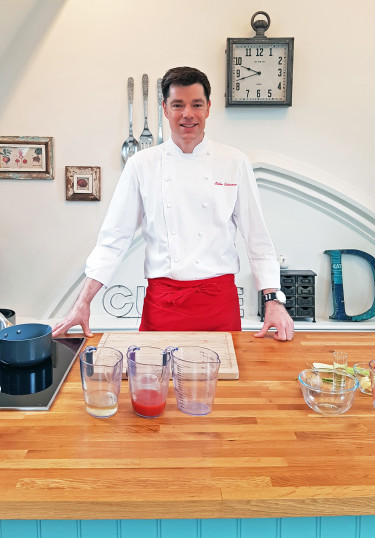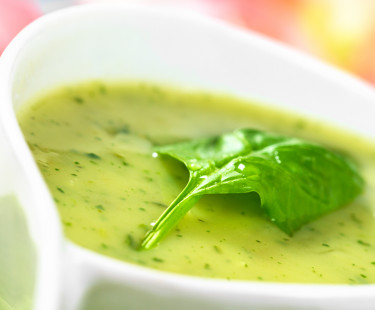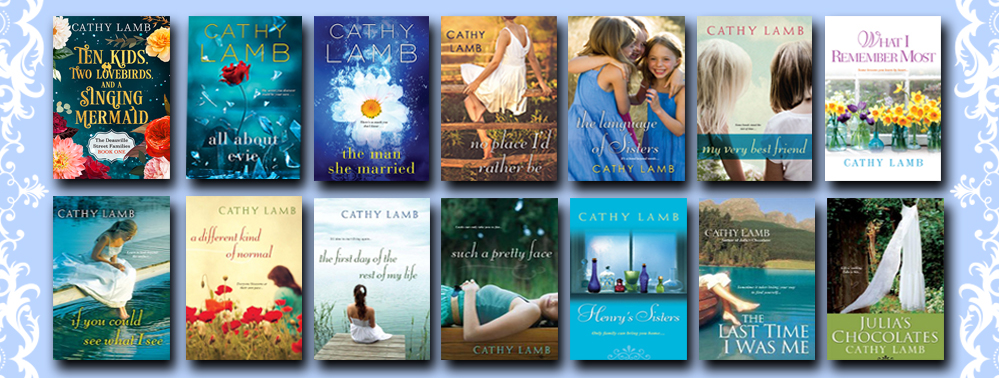A Delicious Interview with Chef Didier Quemener
Hello everyone!
Today I’m interviewing Chef Didier Quemener. He lives in Paris, France.
I know, I know, you want to go to France and eat scrumptious food! So do I!
Didier is the first cook book author I have featured here. Why him? Because his recipes are delicious and I love to eat. I am good at eating, not so good at cooking, but Didier has assured me that I can change. Not so sure about that, but I am sure that if you make his recipes from his new book, Chef Q In Paris, you will be delighted.
Didier, tell us about yourself. We need to know the man behind the stove and the spices and the sauces. When did you decide to become a chef? What were the events in your life that led you to this career?

I actually studied literature at the Sorbonne—but my friends used to tell me that I should open a restaurant! I’ve always enjoyed cooking, but as you can imagine, there is a big difference between cooking for your family and friends, and doing it professionally. I lived in the United States for a few years, working in management for a translation company, and when I moved back to Paris, it was difficult to get a job. It was my wife’s idea to pursue a culinary career. She’s always been of great support, and I felt that making this dream come true would be a tribute to her Italian family, especially after all I learned in the kitchen from her mother and grandmother!
I have always heard that training to become a chef is rigorous and difficult, often dealing with rigorous and difficult chefs. Is that true? What was cooking school like for you?
Pastry at Ecole Ritz Escoffier in Paris and countless hours, working harder and harder, alone in my kitchen! Just like numerous self-taught chefs (Chef Guy Martin, Chocolate Master Jacques Genin to name a few), you have to work extremely hard in order to achieve a proper level of skills in this field.
As I mention in the cookbook, the basics came from my grandmother, then I traveled and learned from other passionate cooks and chefs in the UK, China, US, and across Europe. I learned everything I know about Italian cuisine from my wife’s grandmother, who made her own pasta, sausage etc.
Training to be a chef is indeed tough because the hours are long, and it is also extremely physical. When you’re in a cooking class, you are in competition with the other students and with yourself. You must excel all the time. There will always be another apprentice who will do better. There is always a bigger fish, as we say. New techniques, news methods, new challenges… You do not get bored.
So yes, your mentors are rigorous and sometime difficult, but it is understandable: They expect the best of you. After all, you are entering one of the most stimulating and rewarding of worlds.
Now that I teach classes as well, I try to remember that we are also very lucky to do something that we love, and that one of our missions is to spread our passion.
You mentioned your grandmother and her impact on your love of cooking. What else did you learn from her? I would love to hear her secrets for excellent cooking.
It is actually pretty simple: One of the most important things she taught me is to be patient! Whether she was making patés, tarts, or beef Bourguignon, there would be no shortcuts. Cooking takes as much time as it takes love.

Your grandmother sounds like a very smart woman.
Tell us a little more about your upbringing and your childhood in the French countryside. I really want to go and hang out in the French countryside, so let me live vicariously through your answer.
I was born in the countryside to the east of Paris and was raised in a small village, which at the time represented fewer than 2,000 inhabitants. As a child, my world was made of wheat, corn and sunflower fields, farms, cows and horses, etc. I was pretty much living in this beautiful fairyland postcard-like place—but under the close surveillance of everyone around me. Why? Because my mother worked at the city hall. Therefore, she knew the entire village and so did my grandparents (my grandmother did daycare in her home for the children of the village). You can imagine my daily life as a kid: Whatever I did, wherever I went, I was never incognito.
After school, I would go straight to my grandparents’ farm, would bake and cook, and the same goes for school vacation. On the weekends, Sunday lunches would be typically French: Family and friends gathering, eating from 1 to 5 p.m., taking a two-hour break and then starting over again until bedtime… Good times!
To me, cooking can be difficult and I burn things. Last Thanksgiving the fire alarms went off twice because of teeny, tiny fires I accidentally set. For Christmas my brother, a fire fighter, gave me a new fire extinguisher. He thinks he’s funny. Anyhow.
Why do you love cooking so much? What makes it such a serious/fun/happy/fulfilling endeavor for you?
Cooking is always a new experience, even when you are making the same dish several times.
And believe it or not, to me it’s the best anti-stress. If I’m tired, I cook. If I have a free weekend at home, I cook. If I do not cook, I’m thinking of new recipes to develop… Kind of an obsession.
Where do you work now? What do you like most about being a chef and what is challenging?
Outside of my private clients, market tours and assignments with my chef mates in Paris (or wherever a mission pops up), I teach at The Michel Roux Jr Cookery School in London.
Being a chef is reinventing yourself every day. I particularly enjoy the fast pace of the job, the opportunity to often be exposed to new products I can cook with, and of course, sharing my love for this profession with people! In terms of challenges, it is not rare that something does not go exactly as planned in the kitchen (produce, staff, equipment, etc.). So even when everything seems smooth and going according to the schedule, you are constantly on the lookout for a potential grain of sand in the gears. Troubleshooting is part of the job.
What are the rules in a kitchen at work in terms of how people work together? For example, everyone has their own job in the kitchen, correct? My job, of course, would be eating.
We all have different responsibilities, and organization is the key word. Everyone knows what she/he is supposed to do at the moment it must be done. If one person forgets that, then things can quickly turn to chaos, and the result in the dish could be disastrous!
What is the atmosphere in a kitchen like? Tense? Rushed? Interesting?
Strict. We are all having fun, but when it’s rush hour, there is no time for jokes. No one should run around or panic. We are all here to work together and help each other. It is a real team effort that could become magical if we all play the same game. Of course, it is stressful at times, and pressure is constant: The more pressure, the merrier for me! I love the feeling of knowing that you need to get everything done perfectly all the time, over and over again.
You said that fresh ingredients must be used. What are your other rules for cooking?
I’ll make a short list for you:
1) Always wash your hands before touching anything.
That may sound simple, but believe me, it is not…
2) Sharpen your knives.
Nothing more annoying than cooking at a friend’s place with knives that do not cut.
3) Know your pans.
Certain pans were made for certain types of cooking: Do not get confused.
4) Clean as you go.
If your counter top is a mess after 10 minutes of cooking, that will show in the dish, because sooner or later, you will add or mix the wrong ingredients together.
5) Easy with the seasoning.
You are not on a TV show where seasonings might be tossed on a little too liberally to get the point across. And you are not on a plane where meals need extra seasoning because of the altitude. Season during cooking, but be careful and precise.
6) Taste as you go.
Impossible to cook properly if you do not taste, even if you know the recipe by heart and have made it a million times.
7) Less is more.
Use as few ingredients as possible, only adding more ingredients when needed. Excellence is often in simplicity.
8) Texture rhymes with flavor.
Play on the different contrasts to create more interesting dishes.
9) Do not get distracted.
Keep an eye on what’s going on in the kitchen. In the cooking world, an extra 10 seconds could definitely ruin a recipe.
10) No salt on the table, just pepper.
Check seasoning (salt and pepper) before serving, but do not let your guests put their hands on the salt. By default, they will always add more salt before even tasting their dish.
I love soup. I could eat it all day. What are your three favorite soup recipes? What about dessert? And your three favorite main courses?
Ha, tough one! Okay, let’s try to answer (my responses could change a week from now since I’m eternally curious when it comes to discovering new recipes):
Soups:
Thai (I love them all!)
Fish & shellfish soup (memories of going fishing and crabbing when I was a teenager and then making the best soups with our treasures!)
Jerusalem artichoke velouté with roasted chestnuts (I know, it’s rather specific)
Main courses:
Duck (in any form!)
My wife’s grandmother’s Italian meatballs and tomato sauce (actually, nothing beats that as it would be my last meal on Earth if I had to choose!)
Veggie stir-fry (I love the texture of fresh, crunchy veggies)
Desserts:
The Opéra cake (layers of Joconde cake (almond sponge cake) soaked in coffee syrup, layered with ganache and coffee buttercream, and covered in a chocolate glaze)
The Paris-Brest (choux pastry with a praline flavored diplomat cream)
Tarte Bourdaloue (pâte brisée for the dough, and almond powder, cream, eggs, sugar and pears for the filling)
If you could have only five spices, which ones would you take?
Smoked paprika
Nutmeg
Sichuan pepper
Black lava salt
Tonka beans

A Recipe from Didier…
After Summer “Healthy” Soup
Here’s an easy and tasty recipe to offer you some moral support as the summer days become a distant memory. If you’ve worked hard the previous months (or not!) to stay in shape in between two sessions of sun-tanning on the beach, this recipe will make sure that your efforts were not vain.
And in the case you were spoiled during vacation season and so was your stomach (maybe a bit too much as a matter of fact!), it is time to get back to business. This quick soup, loaded with greens, will energize your body and give you the extra boost required for the busy weeks of fall!
Serving: 4
Ready in: 30 minutes
Preparation time: 10 minutes
Cooking time: 20 minutes
Ingredients:
2 tablespoons extra virgin olive oil
2 cloves garlic, chopped
½ onion, chopped
2 cups chicken broth (low sodium variety)
2 cups celery root chopped into 1 inch cubes
1½ cups Idaho potatoes chopped into 1 inch cubes
1 cup baby spinach
1 cup Boston lettuce leaves
6 cucumber slices (¼ inch size)
1 teaspoon coarse salt
Pepper to taste
Preparation:
In a casserole pan on medium heat, add olive oil, chopped garlic, and onion.
Let cook for 5 minutes, stirring a few times.
Add celery root, potatoes, washed lettuce and cucumber slices. Cover with chicken broth.
Add coarse salt and bring to a boil.
Cover and let simmer for 20 minutes.
In the meantime, rinse baby spinach under water, pat dry. Set leaves aside.
Mix vegetables in casserole pan thoroughly with a handheld mixer.
Add baby spinach and give a few spins of handheld mixer (just to cut the spinach roughly).
Serve hot.
Cheers!
A glass of water after finishing your bowl… It’s diet time!
Didier’s tips:
Add a tablespoon of almonds in each bowl for crunchiness!
LINKS
Cookbook: https://www.amazon.com/dp/B01KTA8818
Site:
www.chefqparis.com
Twitter:
@ChefQParis
The Michel Roux Jr Cookery School:
https://www.cactuskitchens.co.uk/































Hi Cathy, Thanks so much for interviewing our author/chef and sharing one of his recipes! Reading this has made me hungry…
1Thanks Cathy for the fun interview!
2Cheers,
Didier